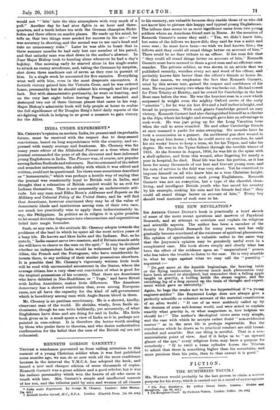INDIA UNDER EXPERIMENT.* CMISNEY'S opinion on modern India, its present
and its probable future, must be received with the respect due to deep seated convictions, based on long acquaintance with the country, and ex- pressed with manly courage and frankness. Mr. Chesney was for many years editor of the Allahabad Pioneer at a time when that journal commanded the pens of all the cleverest and best-informed young Englishmen in India. The Pioneer was, of course, not popular amongIndian Radicals and reformers. But its command of the safest and soundest information, the ability with which it was edited and written, could not be questioned. Its views were sometimes described as " bureaucratic," which was perhaps a hostile way of saying that the journal was consistently loyal to British rule in India, and thought that a relaxation of British control would be an evil for Indians themselves. That is not necessarily an undemocratic atti- tude. Let any man read Elihu Root's Addresses and Reports on the Military and Colonial Policy of the United States, and he will find that Americans, however convinced they may be of the value of democratic ideals and institutions among men of their own race, are much too practically wise to apply them indiscriminately in, say, the Philippines. In politics as in religion it is quite possible to let sound doctrine degenerate into obscurantism and superstitious belief into magic formulae.
Such, at any rate, is the attitude Mr. Chesney adopts towards the problems of the land in which he spent all the most active years of a busy life. He knows and likes India and the Indians. But, as he puts it, " India cannot serve two masters, and if Britain stands aside she will have to cleave to the men on the spot." It may be doubted whether an independent India would be welcomed by our gallant Allies, the French and the Portuguese, who have considerable In- terests there, to say nothing of their similar possessions elsewhere. It is possible that Mr. Chesney's vigorously written little book will be read with unconcealed amusement in the States, where the average citizen has a very clear-cut conviction of what is good for the tropical possessions of his country. That there are Americans who have dabbled in Neo-Buddhism or " Yoga," and have flirted with Indian Anarchists, makes little difference. The American democracy has a shrewd conviction that, even among European races, not all have the capacity for the kind of self-government which is hereditary among men with Anglo-Saxon blood in them.
Mr. Chesney is no partisan reactionary. He is a shrewd, kindly, observant man of the world. He shrinks, wisely, from facile en- thusiasms, though he can write brilliantly, yet accurately, of what Englishmen have done and are doing for and in India. His little book gives ye in a small space a view of India as it is, perhaps not painted in rose-colour. It is therefore the better worth reading by those who prefer facts to theories, and who desire authoritative confirmation for the belief that the uses of the British raj are not exhausted.


























 Previous page
Previous page